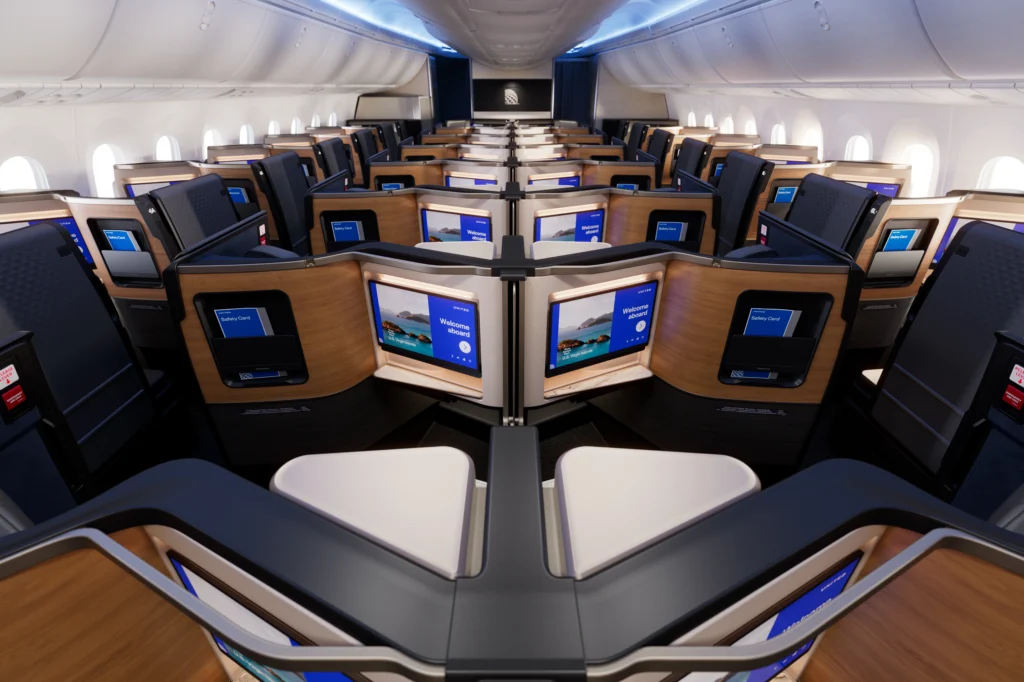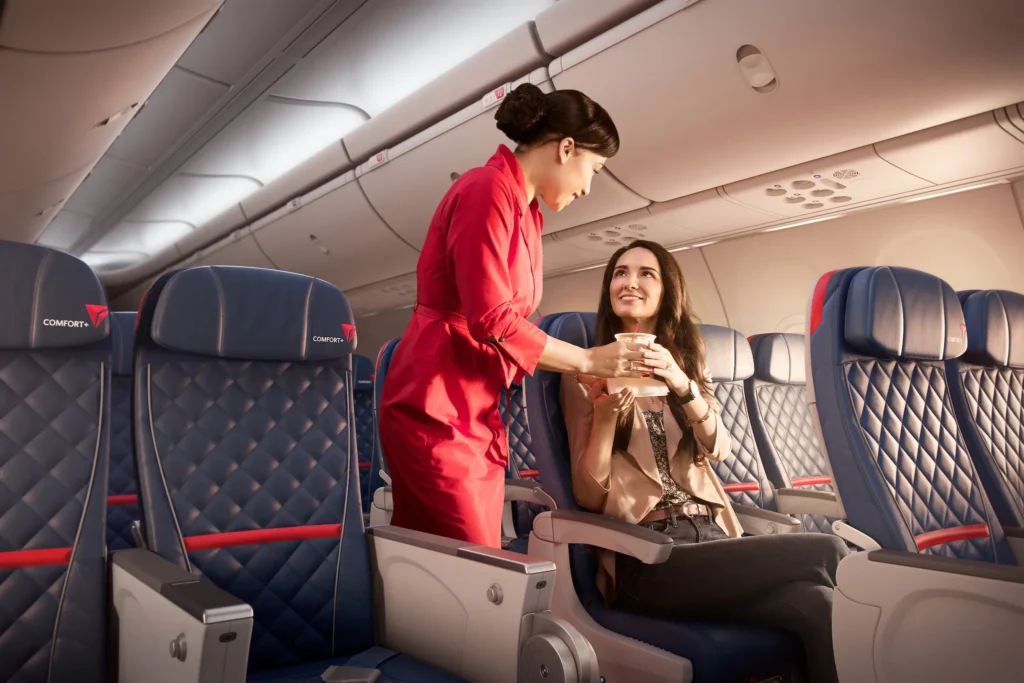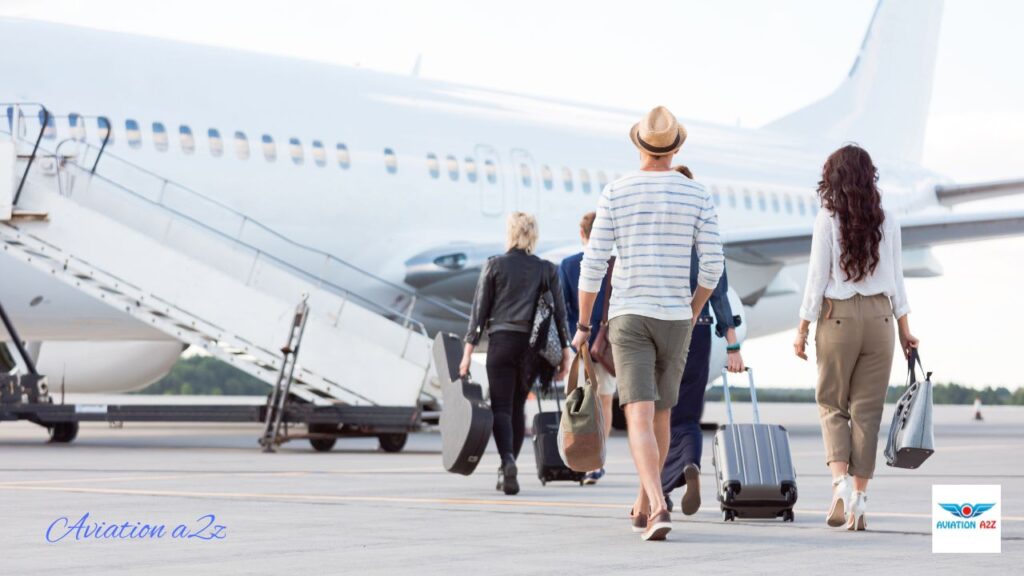
CHICAGO— United Airlines (UA) has revealed intentions to segment its premium cabin offerings, potentially introducing a ‘basic business’ fare with reduced amenities. The shift aligns with Delta Air Lines’ (DL) similar model and could redefine the premium experience on key routes from hubs like Chicago O’Hare (ORD) and Newark (EWR).
The announcement surfaced during United’s Q2 2024 earnings call, where Chief Commercial Officer Andrew Nocella confirmed plans to diversify premium cabin options, mirroring the unbundled approach Delta (DL) announced at its 2023 investor event in Atlanta (ATL).
 Photo: United Airlines
Photo: United AirlinesUnited Basic Business Class Fares
United Airlines (UA) is working on enhancing its premium cabin offerings with new business class suites featuring caviar service, a curated wine program, and 27-inch entertainment screens. These luxury additions, however, will be available on select aircraft only.
In parallel, the airline is preparing to roll out a stripped-down ‘basic business’ fare, following Delta Air Lines’ (DL) segmentation approach.
This strategy reflects United’s broader revenue model of passenger segmentation, successfully applied across its economy classes, including Basic Economy and Economy Plus.
Nocella stated that offering varied premium options allows customers to tailor their travel experience based on preferences and budget constraints.
United aims to replicate this model in its premium cabins, giving travelers the choice between a full-service business class experience and a more economical alternative that excludes certain perks.
The introduction of ‘basic business’ would allow United to tap into price-sensitive customers seeking business class seating without the full suite of premium benefits, View from the Wing reported.
 Photo- Delta
Photo- DeltaDelta’s Unbundled Business Class Model
Delta Air Lines (DL), based in Atlanta (ATL), first confirmed its ‘basic business’ plans in 2023. Their concept mirrors global trends seen in airlines like Lufthansa (LH) and British Airways (BA), where premium cabins have diversified tiers. Delta’s model would exclude traditional business class benefits, such as:
- Checked baggage inclusion
- Complimentary seat selection
- Lounge access privileges
- Business class check-in and priority services
- Flexibility for changes or cancellations
- Mileage accrual and elite status credits
This ‘good, better, best’ framework — already established in Delta’s economy cabin — will soon extend to their business class, creating clearer choices for passengers based on service levels.
 Photo: Business Wire
Photo: Business WireDelta AI Pricing
Delta Air Lines (DL) is fast-tracking its use of artificial intelligence (AI) to set dynamic airfare prices across its U.S. domestic network. The airline, headquartered in Atlanta (ATL), has started applying this AI model on 3% of its routes, with plans to extend it to 20% of flights by the end of 2025.
The technology, developed by Fetcherr — an Israeli firm based in Tel Aviv (TLV) — enables Delta (DL) to adjust ticket prices in real-time based on demand trends. This approach could redefine pricing transparency for passengers traveling through major Delta hubs such as Atlanta (ATL) and Minneapolis (MSP).
Delta Air Lines (DL) is pioneering the integration of AI in airline pricing through a strategic partnership with Fetcherr, a tech startup known for its predictive pricing solutions modeled after financial market algorithms.
The move signifies a major evolution in Delta’s revenue management strategies, as the airline aims to personalize ticket pricing for individual customers.
Announced during Delta’s 2024 Investor Day and reiterated in its Q2 2025 earnings call, President Glen Hauenstein emphasized the operational deployment of AI pricing on a segment of the U.S. domestic network.
Delta aims to scale this model to affect 20% of its flights by late 2025, enhancing profitability through data-driven fare adjustments.
The Fetcherr platform enables granular demand forecasting, allowing Delta to shift from traditional, rule-based pricing to a responsive, market-driven model. By constantly analyzing customer behavior and booking patterns, the AI adjusts fares dynamically, much like stock market pricing mechanisms.
Delta’s leadership has likened this AI tool to a “super analyst working 24/7,” signifying its role in continuously evaluating market conditions and optimizing fare strategies in real time. This technological advantage positions Delta ahead of competitors, though it also raises discussions about price transparency and consumer fairness.
 Photo: Canva
Photo: CanvaRevenue Segmentation: A Growing Trend in Aviation
United Airlines (UA) has emphasized that revenue segmentation has been instrumental in meeting varied customer needs while boosting profitability.
By offering more tailored options, the airline can maximize revenue from both high-paying travelers seeking luxury and budget-conscious passengers preferring lower fares with fewer amenities.
This approach aligns with global aviation trends where airlines segment even premium cabins to capture different market segments. United’s strategy aims to provide flexible fare structures without compromising the quality of its full-service business class.
Stay tuned with us. Further, follow us on social media for the latest updates.
Join us on Telegram Group for the Latest Aviation Updates. Subsequently, follow us on Google News
United CEO Kirby Focusing on Profit Instead of Beating Delta
The post United Airlines Eyes New ‘Basic Business Class’ Fares appeared first on Aviation A2Z.

 4 miesięcy temu
4 miesięcy temu